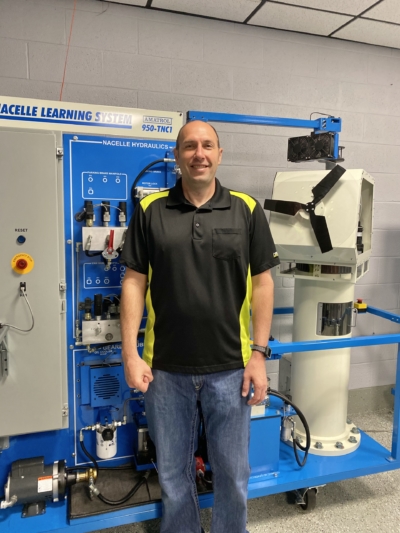 Meet Jack Day, wind technology instructor at High Plains Technology Center in Woodward, Oklahoma. Day’s interview appears as part of a spotlight series on ACTE’s educational institution members (EIM).
Meet Jack Day, wind technology instructor at High Plains Technology Center in Woodward, Oklahoma. Day’s interview appears as part of a spotlight series on ACTE’s educational institution members (EIM).
High Plains Technology Center High Plains Technology Center operates as part of a network of 29 career technology centers across the state of Oklahoma. High Plains trains individuals for success in the workplace. A wide variety of course offerings make career education possible for students from all walks of life: career training, professional and personal interest, online classes and business solutions.
Jack Day, High Plains Technology Center, EIM
Tell me a little about your job on campus. What’s your job title and what do you do?
I work as wind technology instructor. I instruct adult students of varying ages and backgrounds in the exciting and expanding field of renewable energy. Specifically, my experience involves wind turbine generator maintenance, repair, troubleshooting and operation.
Can you tell me a little about your upbringing?
My upbringing was a bit nontraditional in the fact I was adopted and raised by my paternal grandparents. I was born in Pawnee, Oklahoma, and we frequently moved between there >amp; Cleveland, Oklahoma. Once, we moved to Berryhill, Oklahoma. My grandfather owned and operated a semi-truck. My grandmother mainly worked kitchen or janitorial positions.
From an early age, I spent weekends doing farm chores and helping with truck maintenance. During the summer months, on weekdays, I rode along with my grandfather to load >amp; offload materials.
What was your education experience like?
Money was tight. I knew the probability of my grandparents paying for college was slim to none. Honestly, I wasn’t interested in that route anyway. During my eighth grade year, we moved to a small town north of Wichita, Kansas, named Valley Center. It was there, in high school, I pursued career and technical education (CTE) programs offered on campus.
I excelled in every one of my CTE classes. I knew my pathway would find me in a technical, hands-on environment. Upon graduation I enlisted in the United States Navy, where I made a 20-year career.
While enlisted I took advantage of every school offered. My military vocational training was categorized by the level of complexity. More complex training courses counted as credit toward a college degree. The U.S. Navy’s Program Afloat College Education invites college professors to join a deployed crew, for Sailors like myself to take classes. Further, I pursued my associate degree in electrical mechanical technologies from Coastline Community College located in Fountain Valley, California.
What barriers did you face in pursuit of higher learning?
My grandparents focused heavily on developing a strong work ethic. A higher education beyond high school wasn’t a topic in our home. Not that they didn’t want that for me… In truthfulness, I was a bit intimidated by the idea of going to college. I recognized my strength was not in academics, but as a hands-on, vocational learner. The Navy provided both confidence >amp; the financial ability to overcome any >amp; all obstacles.
What led you to your field in CTE?
The Navy really set me up for success. The skills I gained during my military career opened up an opportunity with Siemens Wind Power. That experience combined with being a trained Navy instructor and recruiter — leading young people — made the transition to my current position a breeze.
How do you like working on campus?
I LOVE IT!!! I’m closing out my eighth year with High Plains Technology Center >amp; it feels as if it were just yesterday that I joined the family.
Do you have any advice that you would offer to students who intend to pursue postsecondary education in CTE?
Don’t allow fear of the unknown or what appears to be an unsurmountable obstacle to stand in your way. For every problem there is a solution. Are you motivated to find the answer?






